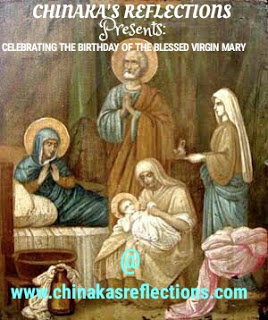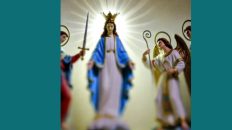According to the Catholic Tradition, we celebrate the feast days (the date of death) of the all the saints, and not their birthdays; however, only the birthdays of three persons are celebrated liturgically – Our Lord Jesus Christ at Christmas (December 25), John the Baptist (June 24), and that of the Blessed Virgin Mary (September 8). Why is this so?
1. The Birth of our Lord Jesus Christ was first celebrated in the Bible by the choirs of angels who gave glory to God that very night: “And suddenly there appeared with the angel a great multitude of the heavenly host, praising God and saying: ‘Glory to God in the highest, and on earth peace to men on whom His favour rests!’ When the angels had left them and gone into heaven, the shepherds said to one another, ‘Let us go to Bethlehem and see this thing that has happened, which the Lord has made known to us’” (Luke 2:13-15). It is no doubt that the birth of Christ has a very rich significance in Christendom; for if Christ had not come, life would indeed be meaningless to us. Hence, the Church in her wisdom and guided by the Holy Spirit fixed a special day for this feast. This we come to know as Christmas Day (December 25).
2. John the Baptist was known as the forerunner of Christ. He was the last of the Old Testament prophets and experienced “martyrdom” while witnessing for the Truth. Many of us know the circumstances surrounding his birth – born of aged parents (miraculously); he lept for Joy in his mother’s womb immediately he heard the greetings of the Mother of God – the Virgin Mary (cf. Lk 1:39-45); Of John the Baptist, Christ said: of all men born of women, none is greater than John the Baptist (cf. Mt 11;11; Lk 7:28). Therefore, his birth was indeed very significant, for it contributed to our salvation history. For this reason, the Church in her wisdom and guided by the Holy Spirit celebrates his birth, and, and this we come to know on June 24.
3. Finally, the birth of the Blessed Virgin Mary, although not described in the Bible, the Bible gives us a clue. According to Elizabeth, under the inspiration of the Holy Spirit, Mary is the MOST BLESSED AMONG ALL WOMEN, just as Jesus the fruit of her womb is equally Blessed (cf. Lk. 1:41-43). Now, Christ talked about John the Baptist as the greatest of the sons of men, the circumstances surrounding his birth proved it. In other words, he received grace in the womb of his mother at the visit of the Blessed Virgin Mary (pregnant with Jesus). Thus, the Holy Spirit inspired Elizabeth and she exclaimed that Mary is the most blessed of women; to this effect, there must be something special about Mary’s birth. How can we know this? At the visit of the angel, we read: “HAIL, FULL OF GRACE” (Lk 1:28). Some versions of the Bible indicate, “Highly favoured one”. Now let us turn to the original Greek version in which the New Testament was written. In the Greek version of the Bible, we read “Kecharitomene” in Lk 1:28. With a rudimentary knowledge of Biblical Greek, I’ve come to understand that KECHARITOMENE is a PERFECT PASSIVE PARTICIPLE of the verb “CHARITOO”. This means “to fill or endow with grace.” Those who have studied Linguistics would understand what a “perfect passive participle” means. This is how it is interpreted: it indicates that Mary was graced in the past and with continuing effects in the present. Therefore, the grace Mary enjoyed was not a result of the angel’s visit. In fact, we Roman Catholics hold that it extends over the whole of her life, from the very moment of her conception onwards (That is how we arrive at the doctrine of the Immaculate Conception). Therefore, She was in a state of sanctifying grace from the first moment of her existence, consequently, she was born in a pure state, that is why we call her Holy Mary. Just as Elizabeth referred her as the Mother of her God (cf. Lk 1:42), we also call her the Mother of God. Notice that Jesus also was referred to as “Full of Grace…” in John 1:14. Thus, for Christ to be born free from sin, His mother too ought to be free from sin as well; just like the Ark of the Old Covenant made or “pure gold” harboured God (in the Old Testament), so also, Mary in the New Testament, as pure as gold, harboured Jesus Christ who is God.
Thus, the Church in her wisdom and guided by the Holy Spirit fixed a special day/feast for Mary’s birth, and this we come to know on September 8 (as we celebrate today).
Dear friends in Christ, as we celebrate this day, the feast of the Blessed Virgin, Mother of God, we pray that we contemplate on the aspects of Mary’s life and imitate her faith, just as the author of the Letter to the Hebrew exhorts us in Heb 13:7. Therefore, given the reasons I cited above and together with that found in the Liturgy of the Hours for today, I dare to say that we celebrate the birth of the Virgin Mother of God because her birth announced joy to the whole world, for from her was born the ‘Sun of Justice’, Christ our God. He released us from the ancient curse and made us blessed; he destroyed death and gave us eternal life”.
HAPPY FEAST DAY TO ALL CATHOLICS!




